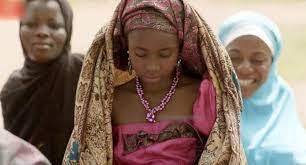
By Milcah Tanimu
The Focusing on Women and Girls Initiative for Positive Change (FOWGI for positive change), an NGO, is urging the enactment of laws that will safeguard and promote the rights of adolescent girls in order to eradicate the practice of child marriage.
Mrs. Rifaku Ademola-Bello, the Founder and Executive Director of FOWGI, made this appeal during an interview with the News Agency of Nigeria (NAN) in Abuja on Friday.
Ademola-Bello defined child marriage as any formal or informal union involving a child (either a boy or a girl) below the age of 18 and an adult or another child, wherein they live as partners as if in a marital relationship.
She identified cultural, economic, and social factors as the drivers of child marriage, particularly prevalent among the poorest households, rural communities, and those with limited education in Nigeria.
The Executive Director emphasized that the implementation and domestication of laws and policies, such as the Child Rights Act, would play a pivotal role in curbing child marriage and promoting the education of girls.
“Without robust legal protections for girls, child marriage remains a prevalent practice in Nigeria, driven by traditional, economic, religious, and legal factors that disproportionately affect girls and women. It is often resorted to in order to evade the social stigma surrounding teenage pregnancy.”
“Child marriage is further perpetuated by unequal gender dynamics, where girls are denied decision-making authority, bodily autonomy, and fundamental rights due to the prevailing belief that girls and women are inferior to boys and men,” she stated.
Ademola-Bello also highlighted that child marriage constitutes a form of violence against children and reflects the undervaluing of girls’ human rights. It not only infringes upon children’s rights but also hampers a girl’s growth and well-being, exposing her to risks such as violence, exploitation, sexual, physical, and emotional abuse, as well as social isolation.
She added that child marriage adversely impacts girls’ access to education, vocational growth, and employment prospects, and puts them at risk of health issues, including sexually transmitted diseases, early pregnancy, cervical cancer, and obstetric complications.
In light of these challenges, Ademola-Bello emphasized the importance of measures such as promoting girl-child education, fostering community dialogue and mobilization, advocating for health support and utilizing substantial data and evidence to inform policies and programs. She also stressed the need to empower girls with information, skills, and support networks, provide economic assistance to girls and their families, raise awareness among parents and communities, enhance girls’ access to quality education, and endorse supportive laws and policies as strategies to eliminate child marriage.
